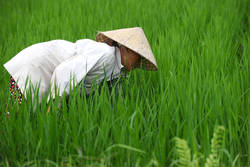Practical applications

AquaCrop can be used as a planning tool and to assist management decisions in both irrigated and rainfed agriculture. AquaCrop is particularly useful for:
- understanding crop responses to environmental change (i.e. as an educational tool)
- comparing attainable and actual yields in fields, farms and regions
- identifying constraints to crop production and water productivity (e.g. as a benchmarking tool)
- developing irrigation schedules for maximum production (e.g. seasonal strategies and operational decision-making, and for climate scenarios)
- developing strategies under water-deficit conditions to maximize water productivity through:
- irrigation strategies (e.g. deficit irrigation)
- crop and management practices (e.g. adjusting planting dates, cultivar selection, fertilization management, the use of mulches, and rainwater harvesting)
- studying the effect of climate change on food production (for example by running AquaCrop with both historical and future weather conditions)
- analysing scenarios useful for water administrators and managers, economists, policy analysts and scientists (i.e. planning purposes)
- supporting decision-making on water allocations and other water policies.
